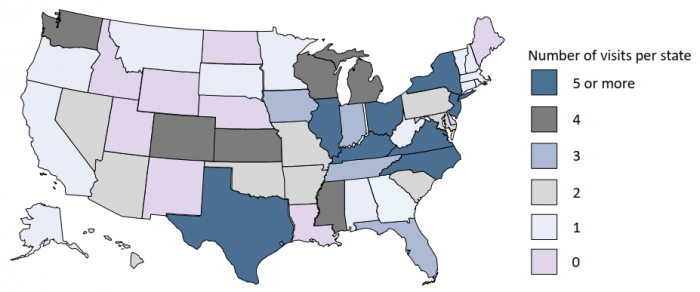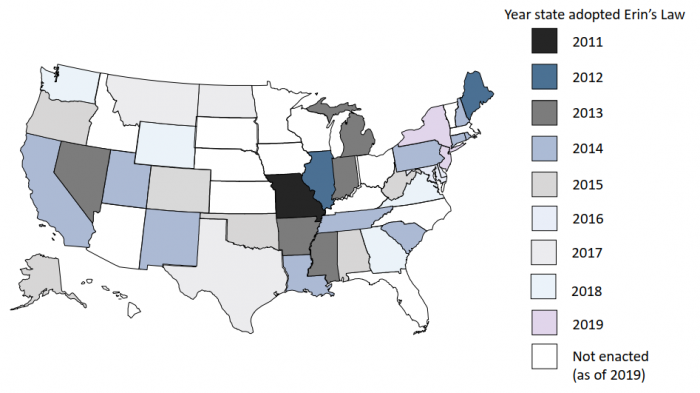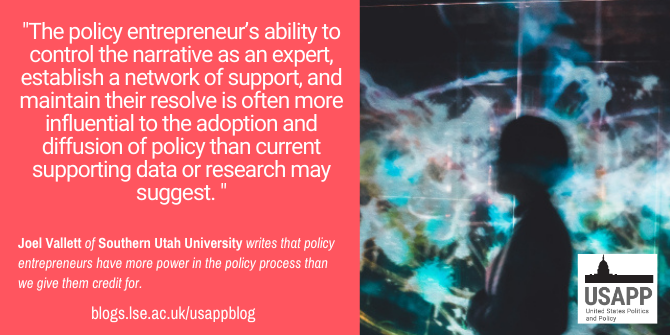 Just how important are individuals in the policymaking process in the US? In new research, Joel Vallett studies the impact of so-called policy entrepreneurs in how policies are adopted by and diffused through the US states. Using Erin’s Law, a child sex abuse prevention education policy, as a case study he finds that the influence of a policy entrepreneur was the most important factor in the law’s adoption by state legislatures. He writes that lawmakers do listen to enthusiastic policy entrepreneurs, especially when they lack the resources to make a quick policy decision.
Just how important are individuals in the policymaking process in the US? In new research, Joel Vallett studies the impact of so-called policy entrepreneurs in how policies are adopted by and diffused through the US states. Using Erin’s Law, a child sex abuse prevention education policy, as a case study he finds that the influence of a policy entrepreneur was the most important factor in the law’s adoption by state legislatures. He writes that lawmakers do listen to enthusiastic policy entrepreneurs, especially when they lack the resources to make a quick policy decision.
There is a lot of rhetoric about “the power of one man or one woman doing the right thing for the right reason,” but the scholarly evidence supporting an individual’s influence is limited. While academic research contains deftly searched economic and political features, little attention has been given to the role and influence of the individual toward the adoption and diffusion of public policy.
Studying the impact of a single person within political landscapes can be challenging to measure. Sure, opinion polls may swing after a well-written speech, but accounting for the individual’s significance is complicated. While individual contributions are a crucial component of the policy process, those who study policymaking have yet to uncover how significant one person’s role is within this process, especially while accounting for other known mechanisms of adoption and diffusion.
Examining the adoption of Erin’s Law, a child sex abuse prevention education policy, provided an opportunity to study the role an individual or policy entrepreneur plays in the policy process. Erin’s Law was heavily advocated by the policy entrepreneur, Erin Merryn. Merryn established herself as an expert, developed a rich network, and fearlessly pushed for the adoption of the law across individual states. As Figures 1 and 2 illustrate, from 2011 through 2019, Merryn traveled to 39 states on various speaking engagements and successfully secured the adoption of that law in 35 states.
Figure 1 – US Map of Erin Merryn visits

Source: http://www.erinmerryn.net/speaking.html
Figure 2 – US Map of Erin’s Law Adoption

Source: http://www.erinmerryn.net/erins-law.html
How policy entrepreneurs help laws to be enacted
Understanding the consequence of the policy entrepreneur is important for two reasons. First, it demonstrates that law makers rely on policy entrepreneurs as policy experts and as a guide to their decision-making. This is particularly important as policymakers across the US do not have equal resources as demonstrated in professionalization scores. With a policy entrepreneur’s support, lawmakers with limited resources can still make rapid policy decisions. It also suggests that law makers do listen to policy entrepreneurs, especially, when they are lacking in the resources necessary to make a swift policy decision.

Photo by Su San Lee on Unsplash
Second, a policy entrepreneur has a substantial role on the policy process and may be effectively employed in pushing forward policy agendas. Merryn gained the attention of state lawmakers and convinced them her policy was the solution to a significant social problem. Her claims were made with minimal analytical support and no guarantees the law would prevent child abuse. However, Merryn’s passion and boldness convinced many her strategy was the best course to protect children. Harnessing a policy entrepreneur’s enthusiasm and drive may provide the impetus necessary for policy adoption and diffusion.
The importance of individual influence on the policy process
While Erin’s Law is only one example, there is substantial evidence of policy entrepreneurs playing similar roles in the adoption process. Michael Mintrom of Monash University, in recent work, outlined a other well noted policy entrepreneurs and their personal characteristics that led to policy adoption or change. Each of Mintrom’s examples demonstrate an individual’s influence on the policy process and underscores the potential influence of a policy entrepreneur.
However, not all policy entrepreneurs rely on powerful, personal experience or prestige like those in Mintrom’s examples or in the illustration of Erin’s Law. In some cases, the policy entrepreneur’s work subtly derailed a debate in a way that went unnoticed by the casual observer. No matter the size of these endeavors, the purpose of the policy entrepreneur has remained three-fold, in that, policy entrepreneurs must establish themselves as policy experts, develop important networks with groups or other individuals that share their vision, and demonstrate persistence and a strong desire for policy change.
Each of the above attributes encourages policy adoption, but the magnitude of these entrepreneurial efforts went underappreciated or, in some cases, unrealized. Determining the impact of the policy entrepreneur in each of the above areas—whether accomplished through an extraordinary feat or the simple exchange of information—is crucial to understanding the policy process.
The final takeaway is that the policy entrepreneur’s ability to control the narrative as an expert, establish a network of support, and maintain their resolve is often more influential to the adoption and diffusion of policy than current supporting data or research may suggest. Beyond comprehending these attributes, more investigation is required to determine why state legislators choose to pay attention or ignore policy entrepreneurs and which tactics improve a policy entrepreneur’s success. A deeper understanding of the policy entrepreneur’s impact could change policy adoption and diffusion across not only state level policy, but local and national.
- This article is based on the paper, ‘The Diffusion of Erin’s Law: Examining the Role of the Policy Entrepreneur’, in Policy Studies Journal.
Please read our comments policy before commenting.
Note: This article gives the views of the author, and not the position of USAPP – American Politics and Policy, nor the London School of Economics.
Shortened URL for this post: https://bit.ly/33qg3S4
About the author
 Joel Vallett – Southern Utah University
Joel Vallett – Southern Utah University
Joel Vallett is on the faculty at Southern Utah University (SUU) and teaches in the Master of Public Administration (MPA) program. Joel’s research interests center around policy incentives as a driving force for policy implementation, success, and ethical decision-making. He has published articles in policy journals such as the Policy Studies Journal and Administration and Society. Joel has continued to implement applied learning in the classroom and looks forward to helping his students develop into committed public administrators.




Thankful that Erin is persistant in her efforts to have Erin’s law passed in every state.